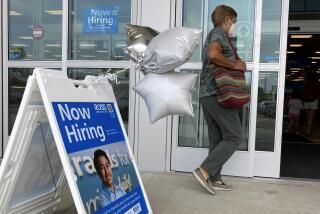U.S. companies cut far fewer jobs than expected, private payroll report says

U.S. companies cut workers in May at one-third the forecast pace, a private report shows, offering some hope that the worst of the coronavirus-related hit to the labor market is over.
The 2.76 million decline in business payrolls last month followed a revised 19.6 million decrease in April, according to ADP Research Institute data released Wednesday. The drop in May was smaller than all but one estimate in a Bloomberg survey of 39 economists. The median projection called for a decline of 9 million.
U.S. stocks rose along with Treasury yields following the report.
The ADP figure was a surprise in part because initial filings for state unemployment insurance totaled more than 12 million in the four weeks that would have been covered by the report. Analysts cautioned that the ADP numbers often differed from the Labor Department’s official readings and the latest report didn’t necessarily mean the government’s numbers would line up, though it does likely confirm that job losses moderated in May.
What may have happened is analysts underestimated the pace of rehiring by businesses, for which there are fewer reliable gauges. Michael Englund of Action Economics, the only economist who had an ADP job-loss estimate smaller than the reported number, said initial jobless claims were less useful as a guide to projecting the figure at the moment than continued claims, which registered an increase of about 3 million during the same four weeks.
Using a metaphor of a bathtub where the drain is unplugged but the faucet is still on, Englund said “the flow into the tub of unemployed is continuing with initial claims, but we’ve pulled the plug on the bottom of the tub — people are clearly returning to work, businesses are opening.”
Even a White House advisor injected a note of skepticism, though.
“It’s way lower than I expected, in a good way,” White House economic adviser Kevin Hassett said on Fox Business as the ADP numbers landed. “The number is so good, it’s such good news, that I’d really have to dig deep into it to see if there’s not something funny going on because that’s pretty far removed from what we would get if we just added up the claims data and so on from the last survey.”
If the ADP numbers prove similar to the Labor Department’s survey, economists are overestimating the damage to jobs in May. Friday’s report is forecast to show private payrolls fell by 7.5 million in May, and the unemployment rate, already at the highest level in records dating back to the 1940s, is estimated to surge even higher to Great Depression-like levels.
The ADP data showed job losses were more moderate by volume at small businesses. Payrolls at companies with fewer than 50 employees shrank by 435,000. Large businesses shed 1.6 million jobs while medium businesses reduced headcount by 722,000.
ADP cautioned that because the report utilized data through the 12th of the month to better align with the Labor Department’s time period for the government’s jobs report, it didn’t reflect the full effect of the pandemic on the labor market.
“The impact of the COVID-19 crisis continues to weigh on businesses of all sizes,” Ahu Yildirmaz, co-head of the ADP Research Institute, said in a statement. “While the labor market is still reeling from the effects of the pandemic, job loss likely peaked in April, as many states have begun a phased reopening of businesses.”
Service-provider employment, which has borne the brunt of pandemic-related job losses, decreased 1.97 million in May, according to the ADP report. Payrolls at goods producers dropped 794,000 as employment plummeted 719,000 at manufacturers.
In addition to the collapse at factories, industry-level declines were largest within transportation and trade, which includes retailers, and healthcare.
ADP’s payroll data represent firms employing nearly 26 million workers in the U.S.
More to Read
Inside the business of entertainment
The Wide Shot brings you news, analysis and insights on everything from streaming wars to production — and what it all means for the future.
You may occasionally receive promotional content from the Los Angeles Times.










